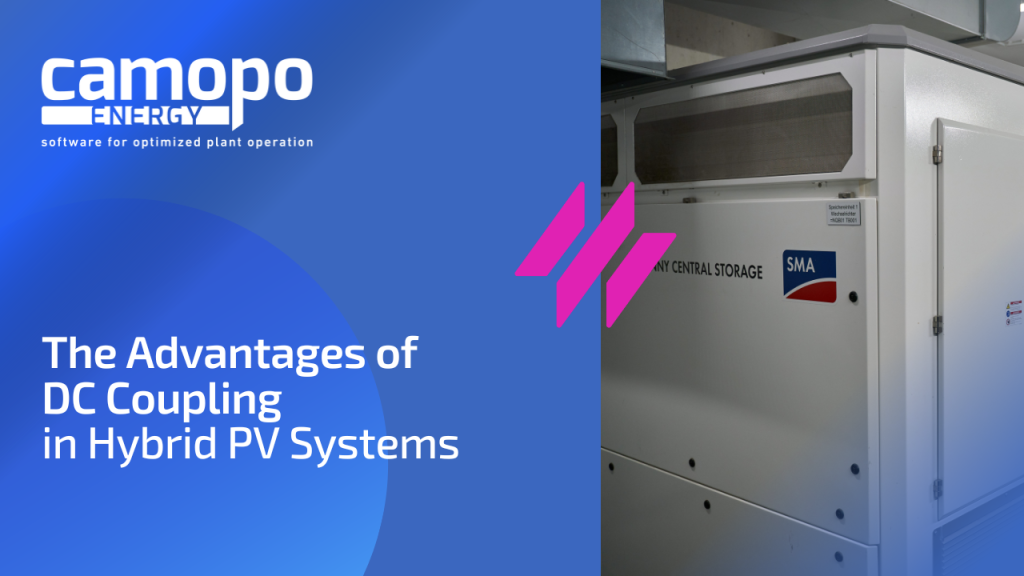The Advantages of DC Coupling in Hybrid PV Systems

The advantages become evident when considering the use cases of DC-coupled systems. Some of these use cases are more efficient with DC coupling than with AC coupling. Additionally, DC coupling opens up new use cases for hybrid power plants.
- 1. Clipping Recapture
In many PV systems, the maximum output power of the PV array exceeds the inverter’s capacity. DC coupling allows the excess DC power to be stored in the battery, preventing energy wastage and maximizing the use of available solar power. - 2. Curtailment Recapture
If the inverter is offline or not allowed to feed into the grid, the energy from the PV array can still be stored in the battery. This ensures that no or as little as possible solar energy is wasted, even during grid outages or restrictions. - 3. Low Voltage Harvesting
DC-coupled systems can start harvesting energy earlier in the morning and continue later in the evening. This is because the battery can help reach the inverter’s DC voltage threshold sooner, allowing for extended periods of energy collection. - 4. Energy Time Shifting
With DC coupling, solar energy can be stored and sold during peak periods that fall outside of solar generation times. This capability allows for better alignment with energy demand and can lead to increased revenue from energy sales. - 5. Peak Shaving
DC-coupled systems can store energy during peak generation times to protect the grid from overload. This not only extends energy output beyond PV generation but also meets grid operator requirements for a flat generation profile, enhancing grid stability. It also opens the opportunity to reach higher PPA prices by selling flat generation profiles for specific offtaker needs (e.g. data center) instead of having a pay-as-produced agreement.
Challenges of DC Coupling
In addition to the advantages, DC coupling also brings challenges that must be considered in system planning. Some of these challenges can be minimized or resolved through technological advancements in the coming years. CAMOPO already contributes to minimizing the challenges of DC-coupled systems through the individual optimization of hybrid power plants.
- 1. Plant Layout
The battery must be located near the PV modules and be easily accessible for maintenance. This requirement must be considered when planning the layout of the system to ensure efficient operation and maintenance. - 2. Grid Requirements
DC technology must meet all specifications of the grid operator, including adhering to the response times within which the systems must react to grid requirements. Compliance with these specifications is crucial for the successful integration of DC-coupled systems into the grid. - 3. Inverter Failure
A failure of the inverter results in the PV and battery being disconnected from the grid. In this case, no more energy can be fed into the grid, highlighting the importance of reliable inverter performance and maintenance. - 4. Limited Experience
Despite all the advantages of DC coupling, there is still limited experience with this technology. This can pose challenges in terms of system design, implementation, and troubleshooting, requiring ongoing research and development.
DC coupling offers numerous advantages for hybrid PV systems, including a stable power supply, cost efficiency, and the ability to maximize solar energy usage through clipping and curtailment recapture. By enabling low voltage harvesting, energy time shifting, and peak shaving, DC-coupled systems provide a versatile and efficient solution for modern energy needs. However, it is essential to consider the challenges, such as plant layout, grid requirements, inverter reliability, and limited experience, to fully leverage the benefits of DC coupling. As the renewable energy landscape continues to evolve, DC coupling stands out as a promising technology for sustainable and reliable energy management.
Are you currently considering hybridizing a PV power plant and still wondering what the best solution for your project is?
Reach out to us and schedule a call with our experts, so we can discuss your current situation and a potential solution.